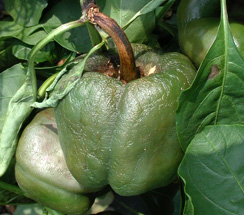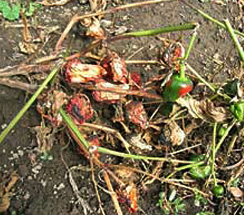| Late blight: Phytophthora capsici |
Symptom:
- Infected leaf tissue - wilted, light green or gray-green, later becoming tan to white and scalded in appearance
- With moisture, leaf spots have a water soaked border
- Fruit rots - irregular in shape and olive green or light green with water soaked borders
- Rots expand rapidly and fruits can be completely diseased and desiccated, causing the formation of "mummified" fruits
- Infected seeds are brown and shriveled
|
| |
 |
 |
| |
Light green border in chilli |
infected chillies |
|
Identification of pathogen:
- Produces microscopic, asexual spores called sporangia
- Sporangia - spherical to pyriform, hyaline, papillate and have a long pedicel attached to the base of the spore
- Pathogen grows well between 25 and 30°C
Mode of spread
- Survives in the soil in host debris
- Roots, stems, and mummified fruits left in the field after harvest, harbor the pathogen for months
- Phytophthora capsici is also seed borne
|
Management:
- Rotation with non-susceptible crops will reduce the amount of Phytophthora capsici surviving in soil
- Fresh, clean seeds should be planted in new potting mix to establish healthy transplants
- Monitor seedlings as well as the field and remove diseased plants as soon as they occur
|
Source of Images:
www.chileplanet.eu/diseases.html
http://www.agf.gov.bc.ca/cropprot/pcapsici.htm |


